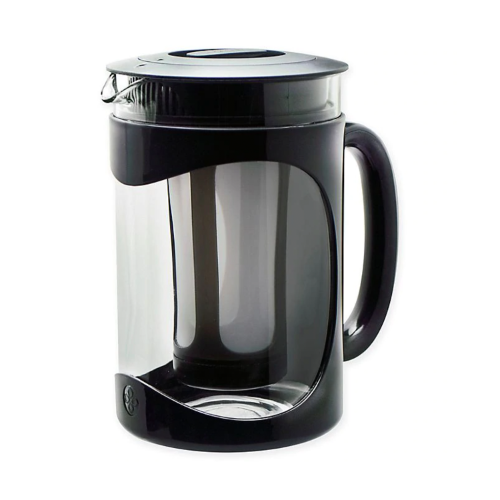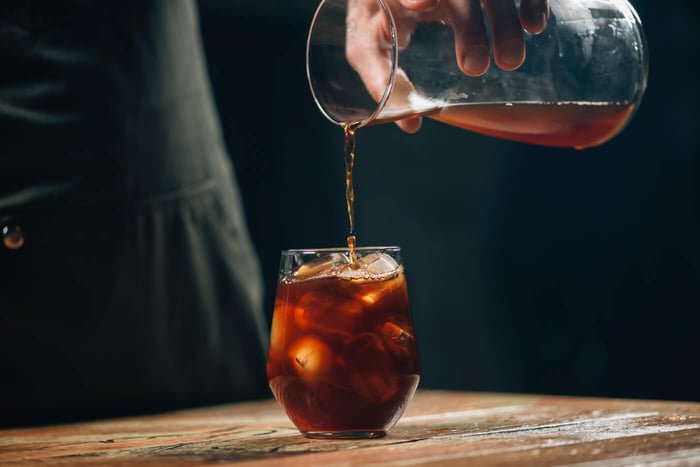Cold brew coffee has taken the world by storm. Its smooth, less bitter taste and potent caffeine kick have made it a favorite for many coffee enthusiasts. But there's one question that keeps popping up: is cold brew less acidic than hot coffee? The answer, like a perfectly brewed cup, isn't quite as simple as yes or no.
Unveiling the Science of Acidity
To discover the answer to the question: is cold brew less acidic? We have to look at acidity. Coffee's acidity is a complexity of various organic compounds. These include chlorogenic acids, which contribute to the bright, tangy flavor, and quinic acids, which can lead to a more bitter taste. The brewing process plays a significant role in how much of these acids are extracted from the coffee grounds.
Here's where things get interesting: hot water acts like an aggressive extractor. Its high temperature pulls out a wider range of compounds, including those pesky acids, leading to a sharper, sometimes harsher, taste. Cold brew, on the other hand, uses cold water for an extended steeping period. This gentler approach extracts less overall, potentially resulting in a smoother, less acidic cup.
Studies like the one published in Scientific Reports support this notion. Researchers found that cold brew coffee had lower total acidity compared to its hot-brewed counterpart. This suggests that the cold brewing process extracts fewer acidic compounds.
Beyond the Science: Perception Matters
However, there's more to acidity than just the presence of acids. Our perception of taste plays a vital role. Cold brew's smooth texture and lower bitterness can mask some of the acidity, making it feel less harsh on the palate. This doesn't necessarily mean it has a lower pH (a measure of acidity), but it can certainly taste that way.
Here's an analogy: imagine two oranges – one perfectly ripe and sweet, the other slightly underripe and tart. The underripe orange has a higher acidity level, but if you add a generous amount of sugar, it might taste sweeter. Similarly, cold brew's lower bitterness allows the subtle sweetness of the coffee to shine through, creating a perception of less acidity.
Factors Affecting Acidity in Cold Brew
While the cold brewing process generally reduces acidity, several factors can influence the final product:
- Coffee Bean Origin: While Arabica beans are generally less acidic than Robusta beans, there's a world of flavor profiles within the Arabica family itself. Beans from certain regions are known for their naturally lower acidity. For example, Latin American coffees like Colombian Supremo or Brazilian Santos tend to be smooth and well-rounded with a gentle acidity. Similarly, African coffees from Ethiopia or Kenya often boast bright, citrusy acidity, but these can be perceived as more delicate and pleasant compared to the sharper acidity of Robusta beans. Exploring single-origin coffees from various regions allows you to discover beans that naturally lend themselves to a less acidic cold brew.
- Roast Level: The darker the roast, the lower the acidity tends to be. This is because the roasting process breaks down some of the chlorogenic acids, which contribute to the tangy flavor and acidity. However, darker roasts also tend to have bolder, more intense flavors that can mask the delicate notes of certain coffee beans. A medium-dark roast might be a good compromise for cold brew. It offers a good balance between lower acidity and maintaining some of the bean's original flavor profile.
- Brew Time and Grind Size: Grind size and steeping time play a crucial role when extracting flavor and acidity from coffee grounds. Imagine the grounds as tiny flavor capsules. A coarser grind offers a gentler approach, releasing flavor compounds at a slower pace. This translates to less acidity being released into the cold brew, resulting in a smoother cup. On the other hand, a finer grind exposes more surface area from the grounds, similar to breaking open the capsules more readily. This allows for a faster and potentially more acidic extraction.
Steeping time acts like a timer on these flavor extractions. Longer steeping times allow for more compounds to be released from the grounds, including acids. For a less acidic cold brew, aim for a shorter steeping time, ideally between 12-24 hours. Experimenting with different steeping times within this range can help you find the perfect balance for your taste preference. By adjusting grind size and steeping time together, you can achieve a smoother, less acidic cold brew that perfectly suits your palate. It's all about finding the sweet spot between extracting the delicious coffee flavors you enjoy and minimizing the amount of acidity released..
Cold Brew for Sensitive Stomachs?
Many people with acid reflux or sensitive stomachs swear by cold brew. While the perception of less acidity is a factor, the science isn't entirely conclusive. Some studies suggest that cold brew might be easier on the digestive system, but more research is needed.
If you experience heartburn or other digestive issues with hot coffee, it's worth trying cold brew to see if it makes a difference. Remember, everyone's body reacts differently.
The Verdict: Less Acidic, More Smoother
So, is cold brew less acidic? The answer is: it depends.
Cold brewing generally extracts fewer acids, leading to a potentially lower overall acidity level. However, factors like bean type, roast level, and brewing parameters can influence the final product.
What is the key takeaway? Cold brew offers a smoother, less bitter coffee experience that might be perceived as less acidic. Whether it truly has a lower pH level depends on the specific brewing process and beans used.
But here's the good news: cold brew offers a fantastic alternative for those who enjoy a gentler coffee experience. With a little experimentation, you can find the perfect cold brew recipe that suits your taste and potentially eases any digestive discomfort caused by hot coffee.
Bonus Tip: Experiment with diluting cold brew with water or milk to further reduce perceived acidity and add a touch of creaminess.
Now, go forth and explore the world of cold brew with Primula's Burke! With a bit of knowledge and experimentation, you're sure to find the perfect cup for your taste buds and stomach.
Burke Cold Brew Maker, 1.6 Qt, Removable Mesh Brew Filter - Primula

$17.99
Brew a distinctively smooth and perfectly balanced cup of coffee at home with the Primula Cold Brew Coffee Maker. When Cold brewing the process extracts the unique and delicious flavor compounds from your coffee grounds. Making coffee in a cold… read more

